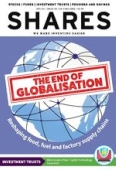This week marked a landmark in international bond markets after Russia defaulted on its foreign debt for the first time in a century.
Despite having a month’s grace, Moscow missed interest payments on $100 million of euro-denominated sovereign bonds on 27 June.
Russia has struggled to keep up with payments on $40 billion of outstanding bonds since it invaded Ukraine in late February.
President Putin accused western governments of forcing Russia into an artificial default, claiming it had the money but was unable to pay bondholders due to its foreign currency assets being frozen.
Investors seemed sanguine about the non-payment, with global stock markets making further gains after a strong finish last week.
Analysts played down the potential impact of the default on bonds and shares and ruled out a repeat of the ‘Long-Term Capital Management’ crisis of 1998, which led the US government to step in after Russia defaulted on its rouble-denominated debt.
They noted, however, it was possible that in retaliation for its humiliation on global financial markets Russia could decide to withhold gas supplies into Europe, and in particular Germany, heading into winter.
A shortage of gas has already seen prices explode higher and led to ‘demand destruction’ in Germany as companies have reduced output and laid off workers.
‹ Previous2022-06-30Next ›

 magazine
magazine








